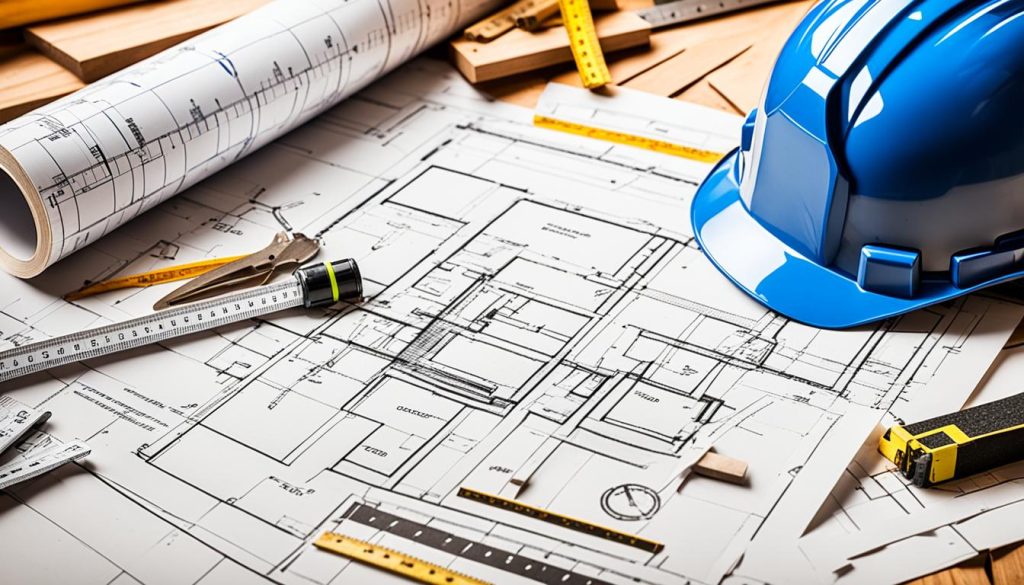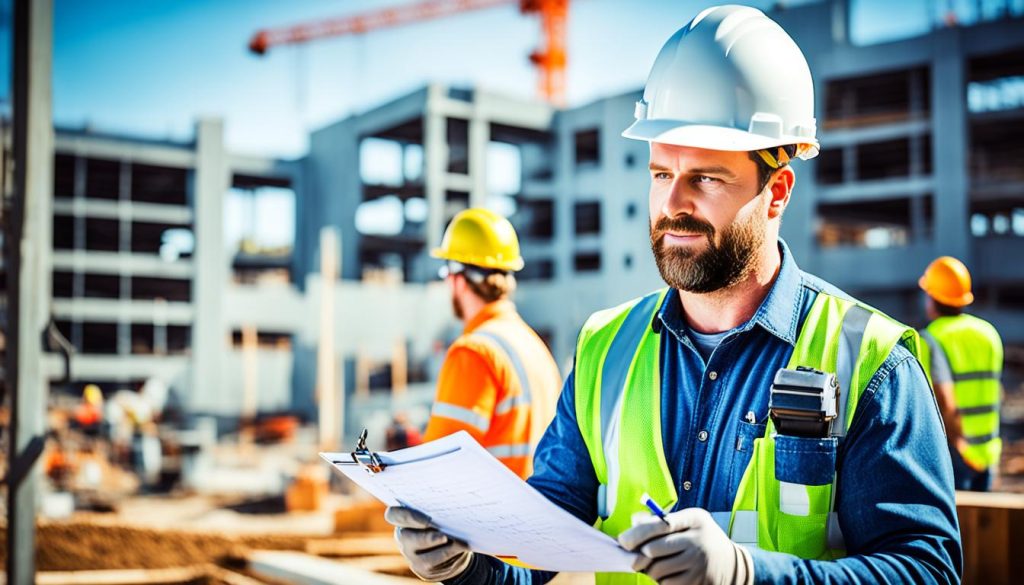Have you ever thought about what it takes to manage a construction project? Who makes sure everything runs smoothly from start to finish? The key player is the general contractor.
A general contractor is vital in both commercial and residential projects. They ensure the construction process goes as planned. This means everything is done correctly and on time.
Knowing what a general contractor does is critical if you’re starting a project. Whether it’s a big or small project, understanding their role is important. So, let’s look closer at how general contractors manage construction projects.
Key Takeaways:
- A general contractor is responsible for overseeing the entire construction process in both commercial and residential projects.
- They manage budgets, coordinate teams, ensure compliance with regulations, and deliver high-quality results.
- General contractors play a vital role in commercial construction, navigating complex projects, adhering to laws and regulations, and managing larger budgets.
- In residential construction, general contractors focus on smaller-scale projects, paying meticulous attention to detail and adapting to changes.
- Effective coordination, team management, and time management are crucial skills general contractors possess.
The Role of a General Contractor in Commercial Construction
General contractors are vital in commercial construction. They oversee big projects, follow local laws, and handle large budgets. These professionals make sure everything runs smoothly.
They face unique challenges, like building large commercial spaces. These include offices, stores, hospitals, and hotels. The general contractor coordinates teams and ensures tasks are done well and on time.
Understanding local laws is a major part of their job. Each area has different building codes. General contractors work with authorities to get permits. This makes sure the project follows the law.
Managing the budget is also key. Commercial projects need lots of money. The contractor must use the budget wisely. They aim for quality materials and skilled workers without overspending.
The general contractor leads a team. This team has architects, engineers, and more. They keep everyone focused on the project’s goals. Good communication helps solve problems quickly.
They also focus on quality. The contractor checks the work, following all building standards. They do regular inspections for quality control.
In summary, general contractors are crucial for commercial projects. They handle laws, budgets, and teams. Their skills help finish complex construction successfully.
Key Responsibilities of a General Contractor in Commercial Construction
| Responsibilities | Description |
|---|---|
| Project Management | Overseeing the entire construction process, coordinating teams, and ensuring project goals are met. |
| Compliance with Laws and Regulations | Navigating regional laws and regulations, obtaining permits, and ensuring compliance with building codes. |
| Budget Allocation | Managing larger budgets, allocating resources effectively, and preventing cost overruns. |
| Team Coordination | Leading and coordinating diverse teams of professionals, ensuring effective communication and collaboration. |
| Quality Control | Overseeing workmanship, maintaining building standards, and conducting regular inspections. |
The Role of a General Contractor in Residential Construction
General contractors are key in turning homeowners’ dreams into reality. They handle everything from small remodels to building new homes. They manage the whole construction, focusing on details and the budget.
A major role of a general contractor is managing money. They plan and use resources wisely, keeping to the client’s budget. This helps the project stay affordable without losing quality.
Attention to detail is vital for contractors in residential projects. They focus on design and craftsmanship, meeting the client’s expectations. They pick the best materials and work closely with subcontractors to ensure everything is perfect.
Contractors can also adjust to any changes in the project. They understand that a homeowner’s needs might change. They work with clients to make these changes without affecting time and money. This way, they ensure the final result meets the client’s needs.
General contractors mix budget management, attention to detail, and flexibility. Their expertise and professionalism make every project successful. They are essential for turning homeowner dreams into reality through smooth construction.
Coordination and Team Management in Construction Projects
Coordination and team management are key for successful construction projects. They apply to both commercial and residential settings. General contractors ensure teams of professionals work well together. They keep communication strong to boost productivity and achieve project goals.
In commercial construction, general contractors handle large teams. These include architects, engineers, and subcontractors, among others. They ensure teamwork and smooth collaboration among members. Through good planning, they manage schedules, budgets, and quality control.
Managing teams in construction means promoting good communication. General contractors are the main point for contact. They ensure everyone from clients to suppliers is on the same page. Keeping communication open helps tackle any challenges that come up.
“Effective communication is the cornerstone of successful construction project management. It enables all team members to work collaboratively, resolve issues promptly, and deliver high-quality results within the designated timeframe.”
In residential construction, the teams are smaller. Yet, managing them well is just as important. General contractors work with architects, designers, and subcontractors. They make sure the homeowner’s vision comes to life while keeping to the budget and building codes.
Being able to manage and coordinate teams is crucial in both types of projects. It helps general contractors use resources wisely, keep workflows in sync, and avoid delays. This ensures projects finish on time.
Benefits of Effective Coordination and Team Management
Good coordination and team management bring many benefits:
- Improved productivity: Clear communication and coordinated efforts cut confusion and boost efficiency.
- Enhanced project control: Strategic coordination lets general contractors see problems coming and solve them early.
- Reduced costs: Good team management means less rework, fewer delays, and staying on budget.
- Streamlined decision-making: Open communication leads to teamwork in solving problems, making decisions faster.
- Optimized resource allocation: Keeping schedules coordinated and communicating well helps make the most of every resource.
Importance of Coordination and Team Management in Construction Projects
| Key Aspects | Commercial Construction | Residential Construction |
|---|---|---|
| Team Size | Larger, more diverse teams | Smaller teams, specialized roles |
| Communication | Multi-stakeholder coordination | Client-focused collaboration |
| Benefits | Faster project execution, scalability | Attention to detail, customization |
| Challenges | Complex bureaucracy, regulatory compliance | Flexibility, evolving client needs |
Effective coordination and management are vital for success in construction. General contractors oversee teams, manage communication, and make sure tasks go smoothly. By following these principles, projects can be efficient, finish on time, and achieve great results.
Time Management in Construction Projects
Efficient time management is key for a successful construction project, no matter the type. In commercial projects, sticking closely to schedules is critical. This keeps the project on its planned path. Any delays can cause extra costs and make clients unhappy. So, managing tasks well is important to finish on time and please clients.
Residential construction allows for a bit more timeline flexibility than commercial projects. Yet, managing time well is still vital. Homeowners have specific deadlines they look forward to. By managing time wisely, construction moves forward without unwanted pauses, making clients happy.
Being flexible is crucial in managing time in residential projects. This means adjusting to surprises or client requests while keeping the project on schedule. It’s all about finding a balance. Through flexibility, contractors can overcome residential construction’s unique challenges and meet or surpass client hopes.
“Time is what we want most, but what we use worst.” – William Penn
The Importance of Time Management
Time management in construction goes beyond meeting deadlines. It touches every part of a project, including:
- Efficiency: Good time management leads to high productivity and efficiency. It ensures all resources are used well.
- Budget control: Construction delays can push costs up. Effective time management helps avoid these issues, keeping projects within budget.
- Client satisfaction: Finishing projects on time satisfies clients. It builds trust and improves the contractor’s reputation.
General contractors who focus on time management can make construction smoother, reduce delays, and enhance success.
| Benefits of Time Management |
|---|
| 1. Improved project efficiency |
| 2. Cost control and budget adherence |
| 3. Reduced construction delays |
| 4. Enhanced client satisfaction |
The Role of a General Contractor in Building Permits and Licensing
General contractors are key in getting building permits and licenses. They make sure all paperwork is right, following local rules. This helps them meet building codes and regulations.
Getting permits for commercial projects is tough. These projects are big with complex designs. General contractors go through lots of rules to comply on every front.
In homes, they’re just as important. They work with homeowners to catch their vision. Then, they get the right permits for work like electrical and plumbing.
General contractors oversee permits and licensing to avoid delays or legal troubles. They keep up with rules and stay close to local authorities. This makes the building process smoother and faster.
| Type of Construction | Permit and Licensing Demands |
|---|---|
| Commercial Construction | More complex and rigorous due to the scale and complexity of projects |
| Residential Construction | Ensuring compliance with local building codes and regulations |
In summary, general contractors are crucial in the construction world. Whether it’s a big commercial project or a residential home, they manage getting permits and licenses. They make sure everything complies with local rules, ensuring projects run well.
Key Responsibilities of General Contractors
General contractors are vital for construction projects. They oversee everything, making sure it’s done right, on time, and within budget. Let’s dive into what general contractors do:
- Overseeing Construction Projects: They manage the whole construction process. This includes organizing activities, setting schedules, and making sure everything runs smoothly.
- Adherence to Building Codes: Following building codes is critical. General contractors know these codes well. This ensures the project is safe and legal.
- Coordination of Subcontractors: They also handle subcontractor coordination. This means selecting them, planning their work, and checking the quality of their job.
“A good general contractor is like the conductor of an orchestra, bringing together the different players to create a harmonious and successful construction project.”
General contractors need great communication and planning skills. They are the main point of contact for everyone in the project. This ensures everyone is on the same page.
With these responsibilities, general contractors ensure construction projects go smoothly. Their expertise and focus on quality lead to well-made buildings. These meet both the rules and customer needs.
General Contractor Qualifications
To become a general contractor, one must have certain skills and get the right licenses. These are needed to work legally in construction. General contractors have a key role in both commercial and residential projects. They manage everything from the beginning to the end.
Commercial general contractors need special licenses. These are for the kind of projects they do. The licenses cover safety rules, environmental laws, and certain building methods. Getting these licenses shows they know how to handle complex commercial projects. It also shows they follow all the rules.
Residential general contractors need other kinds of licenses. These are for home improvements and building houses. The licenses prove they can handle projects like renovations, repairs, and building new homes. They know how to follow local building codes and rules.
Having the right qualifications and licenses is key for general contractors. It shows they are skilled and professional. It also makes sure that projects are done safely and by the rules.

The Importance of General Contractor Qualifications
“Obtaining the necessary qualifications and licenses is vital for general contractors. It ensures they possess the expertise and legal authorization to manage and oversee construction projects effectively.”
The construction industry is always changing. So, general contractors must keep learning new things. This helps them stay ahead. Continuous learning and growing allow them to provide top-quality services and achieve great results.
Benefits of Hiring a Licensed General Contractor
- Knowledge and Expertise: Licensed general contractors know a lot about construction, managing projects, and rules. This lets them handle every part of a project well.
- Compliance and Safety: By following building codes and rules, licensed general contractors focus on safety. They make sure projects have all the needed permits and checks.
- Efficiency and Timeliness: Licensed general contractors are good at managing resources and working with subcontractors. This makes the construction process smoother. Projects are finished on time and within budget.
- Quality Assurance: Licensed general contractors maintain high standards of quality and workmanship. This gives clients confidence that their project will meet or exceed their expectations.
Choosing a licensed general contractor is smart for anyone starting a construction project. Their qualifications and skills mean the project will be done well, efficiently, and according to all rules.
| Qualification | Commercial Construction | Residential Construction |
|---|---|---|
| Safety Regulations | X | – |
| Environmental Laws | X | – |
| Specialized Construction Techniques | X | – |
| Home Improvement | – | X |
| Residential Building | – | X |
Conclusion
General contractors are key in both commercial and residential building projects. Their skills are essential for a project’s success. They manage teams, follow rules, and ensure top-notch outcomes.
They are incredibly important in the construction field. By bringing together subcontractors and materials, they make the building process smoother. Their coordination and communication abilities help meet deadlines and budgets.
In any construction job, general contractors are vital. They deal with complex laws, manage schedules, and get permits. They also make sure everything follows building codes.




